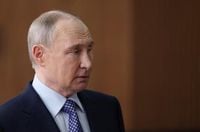In a significant development regarding the ongoing conflict in Ukraine, Dmitry Peskov, the press secretary for Russian President Vladimir Putin, stated that it is "too early to talk about the terms of a deal on Ukraine," yet emphasized that work to resolve the conflict is continuing actively. This statement came during an interview with Pavel Zarubin for the program "Moscow. Kremlin. Putin." Peskov clarified that while negotiations are taking place, they are not being conducted in a public format, highlighting the sensitive nature of the discussions.
Peskov noted that there are areas of agreement between Washington and Moscow, particularly concerning Crimea, but acknowledged that disagreements remain. He pointed out that the Trump administration believes that Kyiv's desire to join NATO sparked the conflict, a sentiment echoed by the previous Biden administration, which further fueled tensions. Currently, the United States is proposing a peace agreement between Russia and Ukraine, although Peskov mentioned that no one has seen Trump's specific plan.
As the negotiations progress, Moscow has publicly articulated its terms and is now in a bargaining phase, with Europe emerging as a significant opponent to these terms. Brussels has expressed that any proposal involving the cession of territories to Russia is "unfair," further complicating the dialogue.
In a related development, President Putin confirmed during a meeting with U.S. Special Envoy Stephen Whitcoff that Russia is prepared to resume negotiations with Ukraine without any preconditions. Peskov reiterated this stance, stating that Putin has made this position clear multiple times. Whitcoff's visit to Russia on April 25 marked his fourth trip in three months, during which he engaged in three hours of talks with Putin in the Kremlin.
Yuri Ushakov, a presidential aide, indicated that the discussions included the potential for renewing direct negotiations between Moscow and Kyiv, along with other pertinent issues. Kirill Dmitriev, head of the Russian Direct Investment Fund, was also present at the meeting and noted "progress" in the negotiations between Russia and the U.S.
On April 24, Trump announced that most points of a peace agreement concerning Ukraine had been agreed upon, suggesting that Moscow and Kyiv are close to finalizing a deal. He stressed the importance of holding a high-level meeting to solidify these discussions.
Recent reports from Reuters have detailed the terms of the U.S. proposal aimed at resolving the Ukrainian conflict. The plan includes an immediate ceasefire, the initiation of negotiations to implement the agreement, and the provision of security guarantees for Ukraine with the backing of a group of guarantor states. Notably, the proposal calls for Ukraine to renounce NATO membership while retaining the right to join the European Union. It also includes the de jure recognition by the U.S. of Russian control over Crimea and the de facto recognition of Russian control over parts of the Luhansk, Donetsk, Zaporizhia, and Kherson regions.
Other stipulations in the plan involve restoring Ukrainian control over the Kharkiv region, transferring the Zaporizhzhia nuclear power plant under formal Ukrainian control while allowing the U.S. to manage the facility, and returning control of the Kakhovka hydroelectric power station to Kyiv. Additionally, it aims to ensure freedom of navigation on the Dnieper River and to lift sanctions against Russia that have been in place since 2014.
In contrast, an alternative plan proposed by the EU and Ukraine suggests that territorial issues should only be addressed after a complete ceasefire and based solely on international law. This alternative framework includes establishing a demarcation line, providing stricter security guarantees for Ukraine, and a phased lifting of sanctions with the possibility of reinstating them if further aggression occurs.
As the negotiations unfold, the American side has warned participants about the potential for withdrawing from the talks if progress is not made. On April 24, Trump indicated that the issue of U.S. withdrawal from negotiations could become relevant "in a couple of weeks," expressing optimism that a peace agreement could be reached during that timeframe.
With both sides appearing to have overlapping interests but also significant points of contention, the path to peace remains fraught with challenges. As the international community watches closely, the stakes are high for Ukraine, Russia, and the broader geopolitical landscape.




